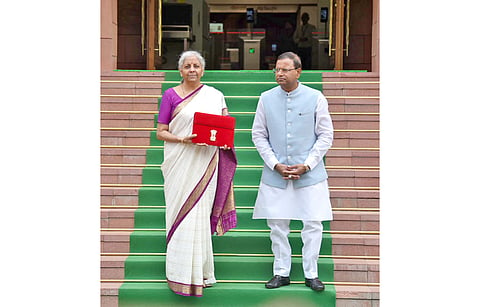

MNRE secures INR 191 billion in budget: The Indian Ministry of Finance has allocated INR 191 billion ($2.28 billion) to the Ministry of New and Renewable Energy (MNRE) in the annual budget for FY 2024-25. This is an annual increase of more than 143% over INR 78.48 billion ($937.5 million) in the budget FY 2023-24. Announcing the budget for FY 2024-25, Finance Minister Nirmala Sitharaman proposed to expand the list of exempted capital goods for use in the manufacture of solar cells and panels. This duty currently stands at 7.5%. She also wants to impose a 10% customs duty on solar glass for the manufacture of solar cells and modules, and 5% on tinned copper interconnect for the manufacture of solar cells or modules, both with effect from October 1, 2024. She justified this by saying the country has sufficient domestic manufacturing capacity for solar glass and tinned copper interconnect.
With a mandate of another 5 years, Prime Minister Narendra Modi led government reiterated its promise to launch the PM Surya Ghar Muft Bijli Yojana. It will enable 10 million households to get free electricity of up to 300 units/month. According to the Finance Minister’s budget speech, the scheme’s announcement has attracted more than 1.28 crore registrations and 14 lakh applications. Sitharaman mentioned that nuclear energy is expected to form a very significant part of the energy mix in the country.
400 MW PV project in Rajasthan: Indian renewable energy company ReNew has inaugurated a 400 MW solar power plant in Rajasthan. This is part of a 600 MW power purchase agreement (PPA) for 25 years, signed with the Solar Energy Corporation of India (SECI). The project is located across multiple villages in Pokran and Bhaniyana regions of Jaisalmer districts, on over 2,000 acres. It has a competitive tariff of INR 2.18/kWh. Remaining 200 MW is scheduled to come online by October 2024.
INR 1.27 billion for Rays: Indian solar EPC Rays Power Infra has announced raising INR 1.27 billion ($15.17 million) in its latest fundraising effort to help it develop around 3 GW of solar and wind power parks. This expands its total funding raised over the past few months to nearly INR 2 billion ($24 million). According to a company statement, the funds came from high net-worth individuals, family offices, funds and partners in Alternative Investment Funds. In December 2023, Rays filed its Draft Red Herring Prospectus (DRHP) as it plans to go public with an initial public offering (IPO) later this year. The target is to raise up to INR 3,000 million ($36 million).
JSW contracted for 700 MW solar: JSW Energy Limited’s subsidiary JSW Neo Energy Limited has received a letter of award (LOA) from SECI to set up a 500 MW solar power plant under tranche XV. It will be accompanied by a 250 MW/500 MWh of energy storage systems (ESS). It won this project under SECI’s 1.2 GW inter-state transmission system (ISTS)-connected solar power projects call with 600 MW/1,200 MWh of ESS. Additionally, it has also secured an LOA from the Karnataka Renewable Energy Development Limited (KREDL) for a 300 MW solar power plant at the Pavagada Solar Park in the state of Karnataka. With these projects, JSW said its total locked-in generation capacity has gone up to 16 GW and its total locked-in ESS capacity has increased to 4.2 GWh. By FY 2025, it targets an installed generation capacity of 10 GW, up from the current 7.5 GW.
TPRMG signs MoU with NDDB: Tata Power subsidiary TP Renewable Microgrid (TPRMG) has announced a memorandum of understanding (MoU) with the National Dairy Development Board (NDDB) to advance renewable energy technologies within the dairy value chain. It includes the solarization of Dairy Cooperative Societies (DCSs), Bulk Milk Coolers (BMCs), and Milk Chilling Centers, facilitated by cutting-edge solar microgrid technology. Additionally, Mujkuva village in Gujarat’s Anand district will be transformed into a carbon-neutral village by the duo. They believe this will establish a benchmark in the dairy industry by integrating green energy solutions and promoting sustainability across the entire milk value chain.
